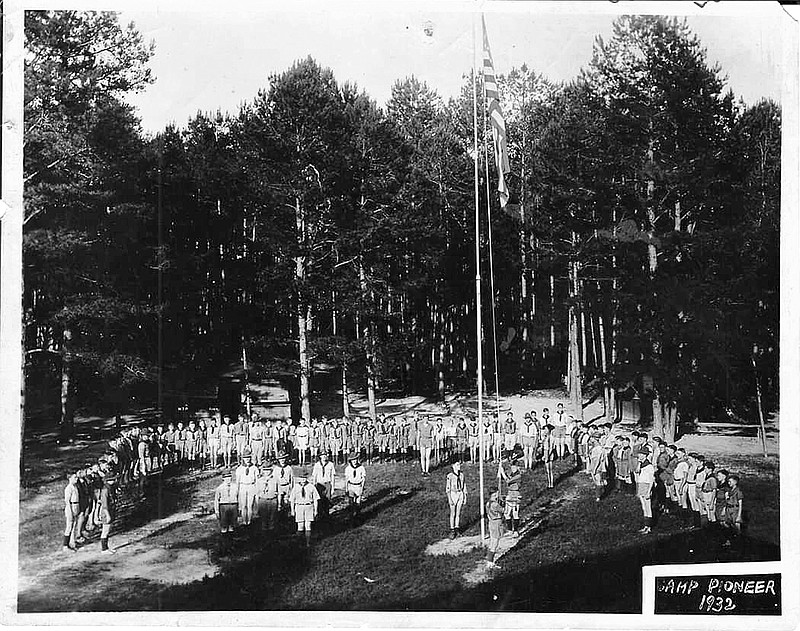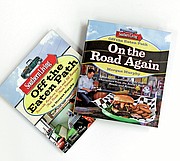The storied history of Camp Pioneer as a beloved home for Scouting adventures in Hatfield, Arkansas, may have recently come to a close, but memories of the camp will linger meaningfully for the boys and men who grew up there and worked there.
At the end of June, the Caddo Area Council Boy Scouts of America accepted an offer for purchase of the site, given the need for cost-prohibitive repairs to the camp, which Scouts had enjoyed for more than a century.
It's been a place where boys - through successive generations since 1916 - visited to earn their merit badges and those outdoor skills of the wilds while they put into practice the time-honored Boy Scout values.
Boys have learned at camp, then later taught there, and so on through the family generations, each one developing a deep bond with the land there near Rich Mountain and the town of Mena, all nestled in the western reaches of the Ouachita Mountains.
Summers spent at Camp Pioneer stamped a lasting impression on the boys who trekked up there to camp, fish, hike and hone the skills so vital to both self-sufficiency and teamwork.In a 2016 Gazette article celebrating the camp's centennial, it was expressed this way: "This story has many events and chapters, full of smiles, tears, joys, fears, discouragement, encouragement, love and challenge." It was, the writer noted, a story about guidance, mentoring and helping boys grasp their potential. "In this way, they have been better prepared to make and take their place in society where they have made a difference for good in a world in such desperate need."
While recent generations drove northward from Texarkana to reach Camp Pioneer, the railroad - so vital to the settlement of Texarkana and other cities in the area - initially brought Scouts to the camp.
According to an online history of the camp at CampPioneer.org, the camp site had humble beginnings but grew from there: "The site now known as Camp Pioneer was first used by the Boy Scouts in 1916. That summer, approximately 20 members of Texarkana's Troop 1 held a ten-day summer camp at the confluence of the Mountain Fork River and Two Mile Creek. At that time, the location was the Railroad Y.M.C.A. campground. The Troop traveled by train from Texarkana to Hatfield, then hiked the last five miles to the campsite. Over the next few years, Troop 1 and other Texarkana Troops used the campground for their summer camps."
In honor of this special place, we spoke with five former Scouts about their fond memories of Camp Pioneer. Edited for space, here is what they had to say:
Dillon Waloshin
"As an Eagle Scout from Troop 19, I always had a great experience at Camp Pioneer. They always had great staff that was there to help you in any way they could and I always felt welcome. We typically attended Camp Pioneer around July 4 and stayed for one week during the summer. That week was by far the best week in the whole summer. If I could go back again I would so that I could appreciate it more.
Probably one of my fondest memories at camp would have to be the food. The food was always the best of camp to me because it was so simple, but somehow they made it taste like a gourmet meal. I don't know how someone could make green beans taste so good but they managed to pull it off. Second to the food was the scenery and trails. There were so many beautiful areas in Camp Pioneer that would just leave you in awe, especially on the waterfront. The raw beauty was something else to be had.
I learned many things from my times at Camp Pioneer. From how to make long-lasting friendships to life skills I have used long since past my time at Pioneer. What I have learned there I have kept with me since.
The things I learned at Camp Pioneer I have since kept with me today. I learned to not only make friends, but to also become less introverted as a person. Before I went to Camp for my first time I was a very shy person, probably like most my age, but after my visits there I was able to get past that. Without those weeks at Pioneer I would most likely not be where I am today as a person. Being around new people, and old friends, was very helpful for me.
I think what made Camp Pioneer so special for many Scouts was a very friendly place to be in. The staff were like family, and some of them were even friends from back home. These factors all contributed to an amazing atmosphere for Scouts all around the area to enjoy."
Chris Brisco
"It's a lot to sum up, but just the expectations, the excitement of going to camp and getting that first real big week-away-from-home experience. You're camping out in tents and away from everything. It's not like today where everybody's fully connected with cell phones and everything. Even back then it was an escape from everyday life. You had no outside contact basically for a week.
The skills you were learning and the hands-on work with other older Scouts and people, adult leaders, that knew how to do real hands-on stuff and pass that information on to you one-on-one so you could really learn a skill or learn the importance of how tying a knot in a certain way was more than just a page in a book. They actually showed you how it worked and why people over the years decided to do it that way. You really got more of a realistic view of why things were done the way they were done.
I probably went there five or six summers, I would say, and that experience led me to want to do more in Scouting so I ended up spending four summers out in New Mexico at their Philmont Scout ranch, which is like 12 days backpacking in high-mountain back country. It's a different level.
There's so many things you look forward to going up to camp: swimming in the river and canoeing and fishing. We would always do the Rich Mountain hike we'd all leave camp and walk from the camp all the way up to the Queen Wilhelmina Lodge, an 18-mile hike it starts in the main part of the camp which is right there where Two Mile Creek goes into the Mountain Fork River. You'd start there at the center of camp and you'd walk all the way up Rich Mountain, which is where Queen Wilhelmina Lodge is now
Anybody you talk to who's done the hike, the first 17 miles is pretty flat and not challenging in elevation change, but it's long. But then you get that last mile or half-mile, it's almost straight up the mountain this was a big motivator for a lot of the Scouts. If you got up there in time you got to order lunch at the lodge, get a real hot meal
Now I'm a teacher. I took a 25-year detour into industry, but now I'm back teaching in the classroom. Just that sense of learning and sharing of information (from Boy Scouts) really carries over into classroom settings observational skills, problem solving skills, patience. Not everything's going to work the first time and you've got to figure out how to make it work."
Russell Sapaugh
"I was there probably around 1963 as a camper, which would mean I just joined Scouting at 11 - and was a camper there for probably four years, and of course the thing there was the overall camp experience. It was also an opportunity for a young kid in Scouting to gather a lot of the merit badges that were taught there, which would go ahead and lead toward advancement in the Scouting program - all your aquatic, all your camping, all your cooking. There probably 30 to 40 merit badges that were offered at that time, which almost all of them in one way or another applied toward advancement.
That was a big part of every summer. You could work on your advancement through the ranks by just being at Pioneer and get as many opportunities as you could to get that. My swimming and life saving, boating and doing all of that occurred at Pioneer. The outside program was what Pioneer offered you had people who knew what they were doing and the opportunities were there
I was pretty successful at it, and then I became a staff member, worked on the staff for about four years, maybe to the early '70s. I worked on the waterfront and the dining hall, and we were up there as staff members for between six and eight weeks, depending on how the camp was operated. You just became almost like family with the rest of the guys who were working as staff members, as well
The guys that I ended up living up there with there over summers, we could hold a conversation for days at a time We all still keep in touch and occasionally we're able to get together
It just was a good place to be. I think it gives a background to fall on. We all go through life and do things, but it gave you a base to go back to. You can always use that as a foundation prior to entering the adult world, those were without a doubt the best times of my life
After the decision (to sell Camp Pioneer) was made, my brother and I went to Pioneer and we took pictures of the camp as we knew it. My plan is to send those out to many of the folks that I worked with in the summers just to remind them what it was like."
Allen Garner"My grandfather was a real active volunteer with the Boy Scouts and spent all his summers up at Camp Pioneer, so I guess my first visit would have been I was a young child. So my first trip to camp I'd have been a young kid, he'd have just taken me up there. That's where it kind of all started. He was an active volunteer with Scouts here locally and a very big volunteer every summer at Camp Pioneer.
I remember him taking me to the OA (Order of the Arrow) ceremonies, just taking me around camp, being a kid playing in the creek, things like that. Hanging out with all his old friends.
The older I got and enrolled in Scouting and becoming a Scout, I would go up there on the old timer reunion weekends because that's when all the older guys got up and got together and did all their stuff, so I would go then.
And when I became a Boy Scout, which would have been in the late '80s, early '90s, unfortunately my grandfather was killed in a car wreck in October of '89. In 1990 was my first year as a Boy Scout to actually attend Boy Scout camp for a week-long session of course it was kind of surreal and crazy the fact that him and I never got to spend that time with me as a Scout at camp while he's there as a volunteer
I was an actual camper with Troop 86, spent my first full week there, earning merit badges: fishing, canoeing, swimming, doing all those things. I knew then what I'd already kind of thought, was that I had to be on staff. I wanted to be a staff member and I wanted to be in the OA and I still wanted to be one of those Indians, right? So, in 1993 I became a staff member at Camp Pioneer for my very first time as a staff member 14 years old, I became a CIT, which stands for Counselor in Training it was pretty cool for me, fulfill that dream, follow in his footstepsI was on staff and I was elected to be one of lodge officers of the Order of the Arrow. I became one of the Indians that I always sought after to be as a young kid up there. I was able to perform in the Friday night ceremonies that I started seeing as a young kid, then obviously as a camper the weeks that I went as a Boy Scout
When you're a kid you're running around in the woods, you want to play in the creeks and do the canoe and have all the fun. But you can find creeks anywhere, you can find tall woods anywhere and you can find hiking trails anywhere. And I guess the thing that separated Pioneer from anything, any experience I ever had in my life was the people. It was a family-type culture. Even going up there as a visitor you felt it.Brotherhood, I think you learn selflessness, always willing to help somebody who needs it."
Don Kyle
"I was first (there) as a Scout. I went up there in 1950. I'd just turned 12 years of age I entered Scouting at that time and went to Camp Pioneer. In those days they had wooden cabins you stayed in, mattresses.
Swimming was taught either in the creek - there's an area called Two Mile Creek up there that butts into the river There were no dams on either one of them at the time. I was a beginning swimmer, if you will, and they would give you swim tests and see where they thought you should go, so I started there in the river.
Swimming was important to me, well to everybody. Everyone needs to know how to swim, whether they do it for the rest of their lives or not at least that's my thinking.
Anyway, I learned a little bit about Boy Scouting and worked all different advancements. Things have changed since then it seems like there were some gentlemen who were off for the summer, but they were cooks for railroads. Of course, railroads had passenger trains at that time. So these gentlemen cooked in the dining hall, and every one of us in our particular group each person in a troop, they shifted around, you served KP duty, which meant you went a little bit early and set the table and prepared things for the meal. They just rotated that around.
It was a good learning experience. You learned to do for others, as well as for yourself, and that was advancement. I loved it
Slowly but surely they were providing more opportunities for Scouts who turned 14 to go to what they called an Explorer Program. One of them, a good friend of mine who's since passed away, I'm sorry to say, he and I and some other guys were in this group. We backpacked.
In those days we didn't have lightweight backpacks that we have now, so we carried canvas tents and canned foods, stuff like that. We backpacked up to Rich Mountain, took two days going up there and two days coming back. I was pretty chubby at the time, needless to say. We made it all right seven boys, and two of us from Texarkana and then the rest of the boys were from Atlanta or down in that neck of the woods a lot of people, Scouting helped them grow as a person."





